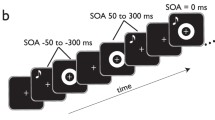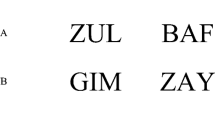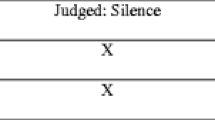Abstract
The differential outcomes effect is a phenomenon where use of a choice-unique outcome for each type of correct choice in a conditional discrimination task increases rate of learning and overall accuracy, as compared to the traditional use of a single, common outcome for all types of correct choices. This phenomenon was successfully demonstrated here in college students (p <.05) using differing immediate sensory outcomes rather than the usual rewards that have obvious hedonic values. Further, a unique version of a concurrent-task, within-subjects design, rather than the typical between-subjects design, was employed. Applications of this effect using sensory outcomes in education and training are discussed.
Similar content being viewed by others
References
BRODIGAN, D. L., & PETERSON, G. B. (1976). Two-choice conditional discrimination performance of pigeons as a function of reward expectancy, prechoice delay, and domesticity. Animal Learning & Behavior, 4, 121–124.
DUBE, W. V., ROCCO, F. J., & MCILVANE, W. J. (1989). Delayed matching to sample with outcome-specific contingencies in mentally retarded humans. The Psychological Record, 39, 483–492.
ESTEVEZ, A. F., FUENTES, L. J., MARI-BEFFA, P., GONZALEZ, C., & ALVAREZ, D. (2001). The differential outcome effect as a useful tool to improve conditional discrimination learning in children. Learning and Motivation, 32, 48–64.
ESTEVEZ, A. F., FUENTES, L. J., OVERMIER, J. B., & GONZALEZ, C. (2003). Differential outcomes effect in children and adults with Down syndrome. American Journal on Mental Retardation, 108, 108–116.
FEDORCHAK, P M., & BOLLES, R. C. (1986). Differential outcome effect using a biologically neutral outcome difference. Journal of Experimental Psychology: Animal Behavior Processes, 12, 125–130.
FOSS, D. J., & JENKINS, J. J. (1966). Mediated stimulus equivalence as a function of the number of converging stimulus items. Journal of Experimental Psychology, 71, 738–745.
FRIEDMAN, G. J., & CARLSON, J. G. (1973). Effects of a stimulus correlated with positive reinforcement upon discrimination learning. Journal of Experimental Psychology, 97 281-286.
GOETERS, S., BLAKELY, E., & POLING, A. (1992). The differential outcomes effect. The Psychological Record, 42, 389–411.
HOCHHALTER, A. K., SWEENEY, W. A., BAKKE, B. L., HOLUB, R. J., & OVERMIER, J. B. (2000). Improving face recognition in alcohol dementia. Clinical Gerontologist, 22, 3–18.
JENKINS, J. J., & BAILEY, V. B. (1964). Cue selection and mediated transfer in paired-associate learning. Journal of Experimental Psychology, 67 101-102.
JOSEPH, B., OVERMIER, J. B., & THOMPSON, T (1997). Food-and nonfood- related differential outcomes in equivalence learning by adults with Prader-Willi syndrome. American Journal on Mental Retardation, 101, 374–386.
KELLY, R., & GRANT, D. S. (2001). A differential outcomes effect using biologically neutral outcomes in delayed matching-to-sample with pigeons. The Quarterly Journal of Experimental Psychology, 54B, 69–79.
KRUSE, J. M., OVERMIER, J. B., KONZ, W. A., & ROKKE, E. (1983). Pavlovian Cs effects upon instrumental choice behavior are reinforcer specific. Learning & Motivation, 14, 165–181.
LINWICK, D., OVERMIER, J. B., PETERSON, G. B., & MERTENS, M. (1988). The interaction between memories and expectancies as mediators of choice behavior. American Journal of Psychology, 101, 313–334.
LITT, M. D., & SCHREIBMAN, L. (1981). Stimulus-specific reinforcement in the acquisition of receptive labels by autistic children. Analysis and Intervention in Developmental Disabilities, 1, 171–186.
MAKI, P., OVERMIER, J. B., DELOS, S., & GUTMANN, A. J. (1995). Expectancies as factors influencing conditional discrimination performance of children. The Psychological Record, 45, 45–71.
MALANGA, P, & POLING, A. (1992). Letter recognition by adults with mental retardation: improving performance through differential outcomes. Developmental Disabilities Bulletin, 20, 39–48.
MILLER, O. T., WAUGH, K. M., & CHAMBERS, K. (2002). Differential outcomes effect: increased accuracy in adults learning kanji with stimulus specific rewards. The Psychological Record, 52, 315–324.
MIYASHITA, Y., NAKAJIMA, S., & IMADA, H. (2000). Differential outcome effect in the horse. Journal of the Experimental Analysis of Behavior, 74, 245–253.
MOK, L. W., ESTEVEZ, A. F., & OVERMIER, J. B. (in press). Unique reward expectations as a training tool in an educational setting. In O.-S. Tan, A. S.-H. Seng, & L. K.-H. Pou (Eds.), Cognitive modification systems: New frontiers in learning and dynamic assessment. Singapore: McGraw Hill.
OVERMIER, J. B., BULL, J., A., & TRAPOLD, M. A. (1971). Discriminative cue properties of different fears and their role in response selection in dogs. Journal of Comparative and Physiological Psychology, 76, 478–482.
PETERSON, G. B., & TRAPOLD, M. A. (1980). Effects of altering outcome expectancies on pigeon’s delayed conditional discrimination performance. Learning and Motivation, 11, 267–288.
STAATS, A. W., STAATS, C. K., FINLEY, J. R., & MINKE, K. A. (1963). Meaning established by classical conditioning controlling associates to the UCS. Journal of General Psychology, 69, 247–252.
TRAPOLD, M. A. (1970). Are expectancies based upon different positive reinforcing events discriminably different? Learning and Motivation, 1, 129–140.
TRAPOLD, M. A., & OVERMIER, J. B. (1972). The second learning process in instrumental learning. In A. H. Black & W. F. Prokasy (Eds.), Classical conditioning II: Current theory and research (pp. 427–452). New York: Appleton-Century-Crofts.
URCUIOLI, P. J. (1990). Some relationships between outcome expectancies and sample stimuli in pigeons’ delayed matching. Animal Learning & Behavior, 18, 302–314.
URCUIOLI, P. J. (2005). Behavioral and associative effects of differential outcomes in discrimination learning. Learning & Behavior, 33, 1–21.
Author information
Authors and Affiliations
Corresponding author
Additional information
This research was supported in part by the Overseas Graduate Scholarship, National Institute of Education, Nanyang Technological University, Singapore, made to Leh Woon Mok and in part by the Center for Cognitive Sciences, University of Minnesota.
Rights and permissions
About this article
Cite this article
Mok, L.W., Overmier, J.B. The Differential Outcomes Effect in Normal Human Adults Using a Concurrent-Task Within-Subjects Design And Sensory Outcomes. Psychol Rec 57, 187–200 (2007). https://doi.org/10.1007/BF03395571
Published:
Issue Date:
DOI: https://doi.org/10.1007/BF03395571




